Courtesy: Daily Rising Kashmir dt July 26th, 2009 by Abdul Mohamin
Srinagar, July 25: Twenty nine years on, the memories of a fateful afternoon still haunt Ghulam Nabi Pandav, Chairman of Tourist Taxi Stand No 2 situated in the busy Lal Chowk. It was 26 July 1980, Pandav recalls, when army personnel stormed the city center and within few hours left with a trail of wholesale beating and arson behind them.
“Some top state police officials were also beaten during the historical army raid from Lal Chowk to Dalgate,” recounts Pandav. “It was all peace, Kashmir was booming with tourism. But the Indian Army men set ablaze scores of our vehicles and damaged dozens others. I still remember the Ambassador Cars bearing Registration No 151, 469, 725 and 903 were set ablaze.”
The Trigger
The trouble, according to still alive eyewitnesses, started when an army vehicle on way to Tattoo Ground, a huge army formation near Batamaloo, collided with another civilian vehicle near Tourist Reception Centre. The driver fled the scene but locals apprehended him. His fellow army men went to the barracks and within no time army streamed in droves and went on a beating spree. I saw people bleeding enmasse and whole of Lal Chowk being turned upside down as the army men shattered everything that came their way inflicting losses to the civilian property worth cores of rupees.
The Tragedy
Pandav says that the army men were so harsh in their raid on people that the local police proved helpless. “Shops were damaged but vehicles were the main target. Police wasn’t able to control the situation. Even the then Superintendent of Police, Ali Muhammad Watali survived a fatal blow.” Ali Muhammad Watali, who retired as DIG in 1989, terms 26 July 1980 as “the most sensitive incident” in whole of his police career.
“I was posted as SP City only a day before the incident,” recollects Watali. On the fateful day Watali, as he narrates the incident, was on his way home when he saw an army vehicle at Lal Chowk having got involved in a motor accident. “As I moved toward my home at Karan Nagar, I directed the then DSP Javaid Makhdoomi (retired as IGP Hqrs in 2008) over wireless that he should handle the case as per the law. Later I came to know that the army had let loose a rein of terror in the city beating and ransacking people. Initially I couldn’t connect the Army atrocities in the city to the earlier accident involving the Indian Army vehicle. On reaching Budshah Chowk I saw an army convoy coming toward Lal Chowk from Tattoo Ground where the Army Supply Corps was stationed. We stopped a vehicle and argued with an Army Captain not to take law in their hands but he didn’t listen. The troopers were targeting vehicles and shopkeepers and beating civilians ruthlessly”
When, Watali goes on to recall, “the police party reached near Taj Hotel, I tried to save a boy who the army men had pounced upon. The moment I told them that I was a police officer they responded hitting me with canes. One of the blows left me unconscious and in a pool of blood. Locals somehow managed to shift me to a hospital.”
In the hospital, Watali was shocked to see Javaid Makhdoomi among the injured.
The Truth
Later an Administrative Committee probed the incident but termed the incident a “quarrel” between army and civilians. “This was never the case,” Watali rues, “I don’t know how Indian Army let loose its men. I don’t know what happened to the Court of Inquiry formulated by the Indian Army to probe the incident.”
Ghulam Nabi Jogi, who then was a fresher among the professional drivers, says: “The crisis ended only after a divine intervention in the shape of a cloud burst. Indian Army had plans to set the entire city ablaze. They had brought enough petrol with them. The last show was to take place at Batamaloo. The area from Lal Chowk to Gagribal (near Nehru Park) was ransacked. Rains spoiled the angry army men’s plans as it forced them back into the barracks.”
The Twist
Abdul Qayoom Shah is yet another eyewitness to this wholesale arson and beating incident. Says he, “The army atrocities on that day sent people thinking over the accord Sheikh Muhammad Abdullah had signed with New Delhi.” The following day, according to Shah, Sheikh appeared in Lal Chowk atop a bus and addressed people. He demonstrated his anger against Indian army and New Delhi. Thus he managed to defuse the volatile situation and promised compensation for the victims. Pandav, the Taxi Stand Chief, confirms that then government later gave compensation to the victims whose vehicles where set ablaze.
Subscribe to:
Post Comments (Atom)










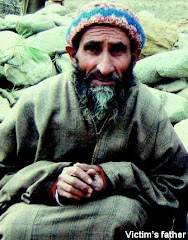



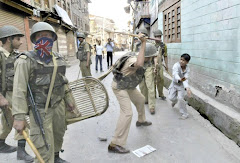


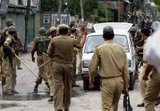



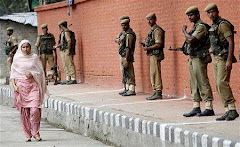







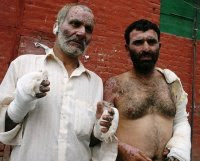






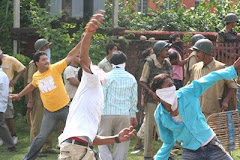

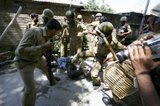




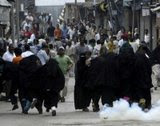







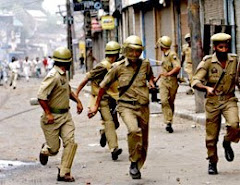
Shameless Indian army personals are terrorists in uniform
ReplyDelete